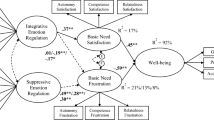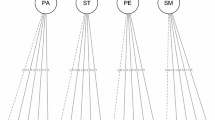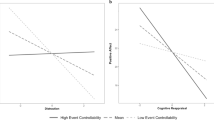Abstract
The aim of the research was to examine the full range of emotion regulation strategies proposed by the Gross and John (Journal of Personality and Social Psychology 85:348–362, 2003; John, O. P., & Gross, J. J. (2007). Individual differences in emotion regulation. In J. J. Gross (Ed.), Handbook of emotion regulation (pp. 351–372). New York: Guilford) process model of emotional regulation. Seventy-three participants from Australia provided information on their use of emotion regulation strategies, well-being, and emotional intelligence. As predicted by the process model of emotional regulation, antecedent focused regulation strategies were associated with greater well-being. Response-modulation strategies predicted no additional variance in well-being beyond antecedent-regulation strategies. In contrast to past research on the selected response modulation strategy of suppression, in the present research response modulation was not associated with negative well-being outcomes. Individuals higher in emotional intelligence showed more antecedent-focused regulation, a finding congruent with model-based predictions.
Similar content being viewed by others
References
Bar-On, R. (2000). Emotional and social intelligence: Insights from the emotional quotient inventory. In R. Bar-On & J. D. A. Parker (Eds.), The handbook of emotional intelligence (pp. 363–388). San Francisco: Jossey-Bass.
Ciarrochi, J. V., Chan, A. Y., & Bajgar, J. (2001). Measuring emotional intelligence in adolescents. Personality and Individual Differences, 31, 1105–1119.
Csikszentmihalyi, M., & Csikszentmihalyi, I. S. (2006). A life worth living: Contributions to positive psychology. New York: Oxford University Press.
Demaree, H. A., Robinson, J. L., Pu, J., & Allen, J. J. B. (2006). Strategies actually employed during response-focused emotion regulation research: Affective and physiological consequences. Cognition and Emotion, 20, 1248–1260.
Diener, E., Emmons, R. A., Larsen, R. J., & Griffin, G. (1985). The Satisfaction With Life Scale. Journal of Personality Assessment, 49, 71–75.
Diener, E., Lucas, R. E., & Scollon, C. (2006). Beyond the hedonic treadmill: Revising the adaptation theory of well-being. American Psychologist, 61, 305–314.
Egloff, B., Schmukle, S. C., Burns, L. R., & Schwerdtfeger, A. (2006). Spontaneous emotion regulation during evaluated speaking tasks: Associations with negative affect, anxiety expression, memory, and physiological responding. Emotion, 6, 356–366.
Folkman, S., & Moskowitz, J. T. (2004). Coping: pitfalls and promise. Annual Review of Psycholology, 55, 745–774.
Frijda, N. H. (1986). The emotions. Cambridge: Cambridge University Press.
Frijda, N. H. (2006). The laws of emotion. New York: Routledge.
Goldin, P. R., McRae, K., Wiveka, R., & Gross, J. J. (2008). The neural bases of emotion regulation: Reappraisal and suppression of negative emotion. Biological Psychiatry, 63, 577–586.
Gross, J. J., & John, O. P. (2003). Individual differences in two emotion regulation processes: Implications for affect, relationships, and well-being. Journal of Personality and Social Psychology, 85, 348–362.
Hariri, A. R., & Forbes, E. E. (2007). Genetics of emotion regulation. In J. J. Gross (Ed.), Handbook of emotion regulation (pp. 110–133). New York: Guilford.
John, O. P., & Gross, J. J. (2007). Individual differences in emotion regulation. In J. J. Gross (Ed.), Handbook of emotion regulation (pp. 351–372). New York: Guilford.
Krompinger, J. W., Moser, J. S., & Simons, R. F. (2008). Modulations of the electrophysiological response to pleasant stimuli by cognitive reappraisal. Emotion, 8, 132–137.
Lyubomirsky, S., King, L. A., & Diener, E. (2005). The benefits of frequent positive affect: Does happiness lead to success? Psychological Bulletin, 131, 803–855.
Mayer, J. D., Salovey, P., & Caruso, D. (2000). Models of emotional intelligence. In R. J. Sternberg (Ed.), Handbook of intelligence (pp. 396–420). New York: Cambridge University Press.
Mayer, J. D., Salovey, P., & Caruso, D. R. (2004). Emotional intelligence: Theory, findings, and implications. Psychological Inquiry, 15, 197–215.
Neubauer, A. C., & Freudenthaler, H. H. (2005). Models of emotional intelligence. In Emotional intelligence: An international handbook (pp. 31–50). Cambridge: Hogrefe.
Perbandt, K. (2007). Differential effects of incongruent anger expression on memory performance. Journal of Individual Differences, 28, 129–137.
Peterson, C., & Bossio, L. M. (2001). Optimism and physical well-being. In E. C. Chang (Ed.), Optimism and pessimism: Implications for theory, research, and practice (pp. 127–145). Washington, DC: American Psychological Association.
Petrides, K. V., & Furnham, A. (2003). Trait emotional intelligence: Behavioral validation in two studies of emotion recognition and reactivity to mood induction. European Journal of Personality, 17, 39–57.
Ryan, R. M., & Deci, E. L. (2001). On happiness and human potentials: A review of research on hedonic and eudaimonic well-being. Annual Review of Psychology, 52, 141–166.
Salovey, P., & Mayer, J. D. (1990). Emotional intelligence. Imagination, Cognition and Personality, 9, 185–211.
Schutte, N. S., Malouff, J. M., Hall, L. E., Haggerty, D. J., Cooper, J. T., Golden, C. J., et al. (1998). Development and validation of a measure of emotional intelligence. Personality and Individual Differences, 25, 167–177.
Watson, D., Clark, L. A., & Tellegen, A. (1988). Development and validation of brief measures of positive and negative affect: The PANAS scales. Journal of Personality and Social Psychology, 54, 1063–1070.
Author information
Authors and Affiliations
Corresponding author
Rights and permissions
About this article
Cite this article
Schutte, N.S., Manes, R.R. & Malouff, J.M. Antecedent-Focused Emotion Regulation, Response Modulation and Well-Being. Curr Psychol 28, 21–31 (2009). https://doi.org/10.1007/s12144-009-9044-3
Published:
Issue Date:
DOI: https://doi.org/10.1007/s12144-009-9044-3




